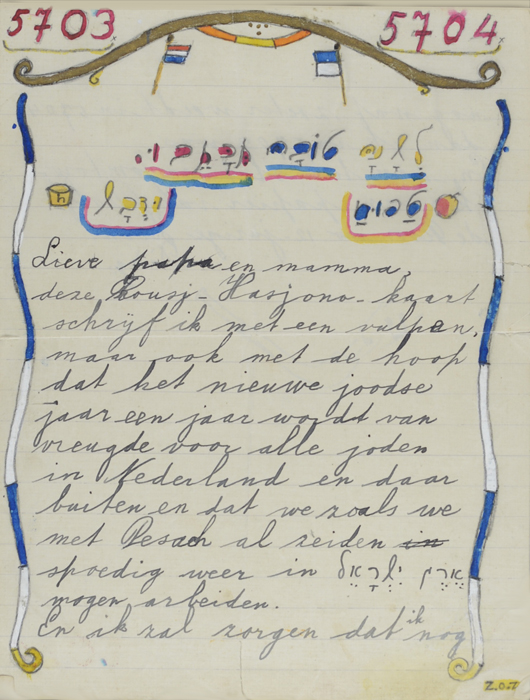Shana Tova (Happy New Year) card that Rudolph-Reuven de Roos wrote to his parents, Isidore-Yitzhak and Margarete-Bernadina, in September 1943
"May you be inscribed for a good year
Apple and Honey [in Hebrew]
Dear Mama and Papa,
This year, I am writing my card with a fountain pen, but also in the hope that this will be a good year for all the Jews in the Netherlands and beyond. As we already said on Passover, may we soon be working in Eretz Israel."
Twelve-year-old Rudolph wrote these words in a New Year card embellished with color illustrations, on the eve of his family's incarceration in Westerbork. The words Eretz Israel were written in Hebrew.
Isidore-Yitzhak de Roos and his wife Margarete-Bernadina lived in Amsterdam. Both of them were teachers, and the family led a traditional Jewish lifestyle. They had two sons, Rudolph-Reuven (b. 1931) and Shlomo Ephraim (b. 1933).
Approximately eighteen months after the German occupation of the Netherlands, the family had to leave their home and move to the Jewish quarter of Amsterdam. Isidore was forced to leave his position teaching history and French at the local high school, and started teaching in the Jewish school. The boys were thrown out of the local school they had been attending, and moved to the Jewish school. On the eve of Rosh Hashana, 29 September 1943, a last manhunt was conducted in Amsterdam, and some 2,000 Jews, including the heads of the Joodse Raad (Jewish council) and its senior members, were moved to Westerbork. Among them was also the de Roos family.
On 1 February 1944, the family was deported to the Bergen-Belsen camp, where Reuven celebrated his Bar Mitzvah. In his testimony, Reuven recalls that he received several gifts, including a slice of bread with margarine and jam that his mother managed to obtain for him. "It was the most beautiful thing a Bar Mitzvah [boy] had ever received in his life," said Reuven. The prisoners at Bergen-Belsen suffered from severe malnutrition. In June 1944, four months after their arrival, Isidore was murdered in the camp. Margarete and the boys survived.
Yad Vashem Archives O.75/3454

